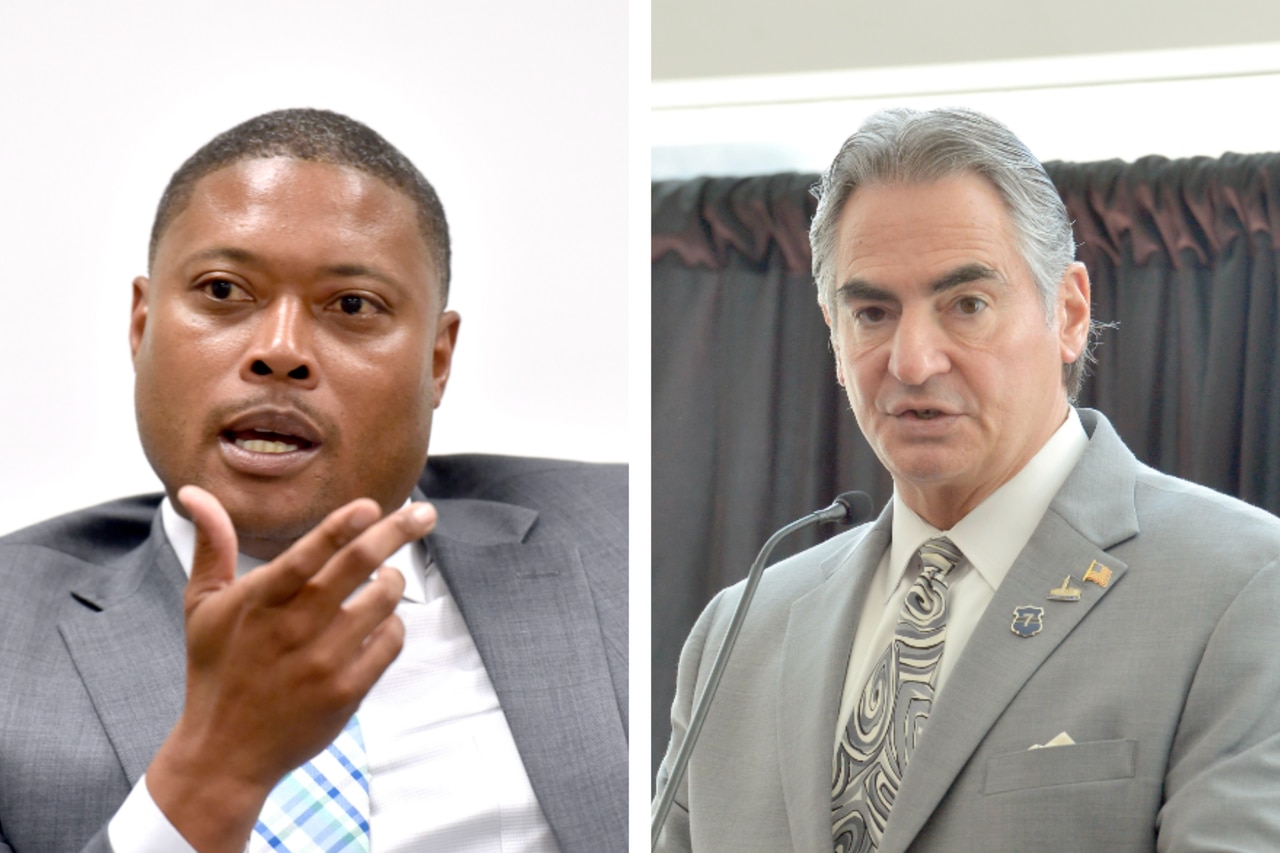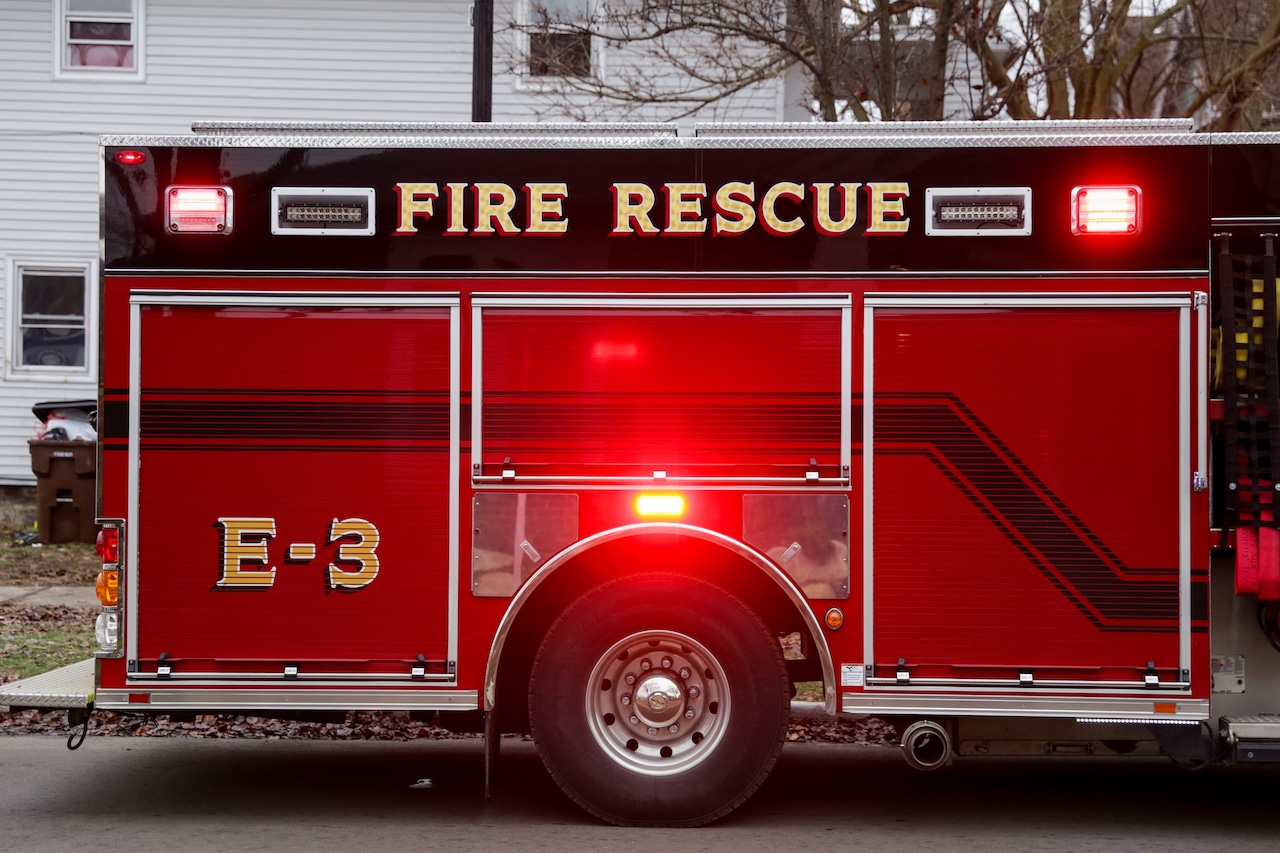
SPRINGFIELD – When voters cast ballots next week, they will choose between two experienced but markedly different politicians. Both want to serve as the city’s mayor for the next four years.
Mayor Domenic J. Sarno is asking residents to return him to the position he has held since 2008. Justin J. Hurst, a 10-year city councilor, is hoping voters will agree 16 years is enough for one person to lead the city.
Sarno and Hurst came out on top in a rare five-way preliminary election on Sept. 12 where the mayor captured 47.7% of the total ballots cast, or 7,120 votes, while Hurst finished second with 4,292 votes, or 28.8% of the tally.
Of the remaining candidates, state Rep. Orlando Ramos finished third with 2,032 ballots and City Council President Jesse Lederman followed with 1,344 votes. Political newcomer David Ciampi finished a distant fifth.
Since September, Hurst, 44, a self-employed lawyer who works mostly in real estate, and Sarno, 60, who was the executive director of the South End Community Center before being elected mayor, have been battling for the city’s top political seat. Both are lifelong city residents, with Sarno residing in Forest Park while Hurst lives in Sixteen Acres.
If elected, Hurst will be the city’s first Black mayor. Sarno is already Springfield’s longest-serving mayor, since his election in 2007.
After the preliminary election, Ciampi and Ramos endorsed Hurst, saying it is time for a change. Lederman has not endorsed anyone.
One of Hurst’s biggest arguments is Sarno has tightened his circle of supporters and his longevity means the same residents and business leaders benefit from his governance.
“Residents of Springfield deserve a leader that is going to operate on behalf of the entire city, as opposed to the select few that is currently occurring,” he said.
Sarno disagrees, arguing he is inclusive and his policies and financial decisions have benefited everyone. For example, the schools have improved, he says, with no high school seeing a graduation rate lower than 86% and most well over 90%. With the COVID-19 pandemic, the School Department started free pre-school, which benefits all families in the city, and at least $750 million has been spent to replace aging schools and more improvements are to come.
Public safety tops concerns
Hurst and Sarno each list public safety as a priority, especially since the city has hit a record 27 homicides this year. But they strongly disagree about how to go about reducing violence. Hurst has criticized Sarno’s handling of police misconduct for years.
In his decade as a city councilor, Hurst said he is most proud of leading the fight to create a police commission to handle hiring, firing, promotions and discipline of the department. He was the City Council president when members put a commission in place and led the charge to take the issue to court when Sarno refused to appoint the five members. The Supreme Judicial Court ordered the appointments.
“At that time we’re in desperate need of police reform and this was an opportunity for that to occur,” Hurst said.
But Hurst said it hasn’t been successful because the mayor has not provided resources the commission needs. Sarno also hand-selected the members, so there is a perception they are beholden to him.
“It is not independent of the police (superintendent) and the mayor of Springfield,” he said. “They don’t have all the power of hiring, firing, discipline and promotions.”
If elected, Hurst said he will start from scratch. Board members will be forced to resign and he will create a committee of people representative of the city to appoint a new commission. From there he will have an open, well-publicized application process to attract as many interested people as possible.
After that he would be completely hands-off and the committee will have the final say in police personnel matters.
“It will be the community, not the mayor and the police chief making the decisions,” Hurst said.
Sarno, for his part, argues the commission is independent and the court order only gave the commission power over disciplining accused officers.
The incumbent also lists public safety as a top priority, but his solutions are different. At any event involving police, Sarno repeats his support for the “brave men and women in blue.” Although there has been plenty of controversy over problems in the police department, Sarno said things are improving.
A scathing report from the Department of Justice accused narcotics officers of widespread abuse, which resulted in a rare consent decree regarding reforms. The department was recently applauded by the feds for making strides. The department has taken a record number of guns off the street over the past two years since the new Firearms Investigation Unit was created. And the department was the first to implement widespread use of body cameras for all officers, Sarno said.
Sarno said he will not back down on his attempt to get bail reform through the Legislature to ensure repeat violent criminal offenders are locked up for longer, even though that effort has been questioned by many, especially in the legal community.
“I’m going to continue to hammer away at the judges,” he said. “If you keep violent repeat criminal offenders in jail, you will continue to see gun violence go down incrementally.”
Hurst said police problems are far from the only reason he wants to serve as the city’s next mayor.
“I will always be honest with residents of Springfield and If I say I’m going to do something, I will do it. That means reducing taxes and following on the mayor’s broken promise to eliminate the trash fee,” Hurst said.
Challenger’s questions
One of the first things Hurst said he would do if elected is to bring in the FBI and request an audit of the distribution of the American Rescue Plan Act pandemic recovery funds to ensure every grant was above board.
At least twice, Hurst has called out the mayor on his distribution of the $123.8 million the city received in federal funds, claiming they are mostly benefiting Sarno supporters. While a committee of city employees and advisors examines the requests, the final awards are under the sole discretion of the mayor.
Most recently, Hurst questioned a $50,000 award to the Springfield Technology Park, saying it is a conflict of interest because the mayoral chief of staff, Tom Ashe, and Phil Dromey, deputy planning director, serve on its board of directors. Earlier, he questioned whether there was a conflict of interest because $250,000 went to the City Line Café, even though owner Martin Cunningham is a Planning Board member. State laws imply there was no impropriety.
“I will also audit every department in the city of Springfield to every extent possible to find where funds are being misspent and fraudulently spent,” Hurst said.
Sarno scoffed at the idea that money is being spent improperly. He views the city’s financial stability as one of his biggest accomplishments.
“I think I’m most proud of a couple of things. One is the financial strength and stability of the city,” he said. “When I took over, you had a control board and the (city was on) the brink of bankruptcy and now we have the best bond rating in the city’s history and a healthy reserve of well over $60 million.”
Sarno talks about his success leading the city through natural and man-made disasters, including the 2011 tornado, a freak October snowstorm that left most of the city without power for days, a downtown gas leak explosion in 2012 and the COVID-19 pandemic.
“There are so many things we have accomplished but there is more work to be done. I live and I love this job 24-7 and my energy is still there and I respectfully ask the voters to continue their support,” Sarno said.
Fundraising disadvantage
The Hurst name is well-known in Springfield circles, since his parents are prominent members of the city’s legal and media communities and his wife is a School Committee member. Still, the contest is an uphill one for Hurst in one sense because Sarno is able to far outspend him in the campaign.
Both argue their campaigns are less about money than about having friends, family and dedicated volunteers who they credit with working to get them elected.
As of Sept. 1, Sarno had $86,832 in his campaign account. He raised $14,965 and spent $31,505 on Sept. 30 he had $70,292 on hand to campaign for the Nov. 7 election. The next reporting deadline is Tuesday.
Hurst had $1,010 on Sept. 1 and raised $19,232 during the month. He spent $16,9259, leaving him with $3,982 at that point, before October contributions were reported, heading into the head-to-head race with Sarno.
A lot of his campaign is relying on grassroots efforts. Hurst said he has been reflecting on great conversations he has had about the future of the city as he entered the final days of the campaign.
“The money we have raised has put us in striking distance,” Hurst said. “In the next two weeks radio and TV ads will be airing and mailers have been sent out and literature is being passed out. We have everything we need to be successful.”





